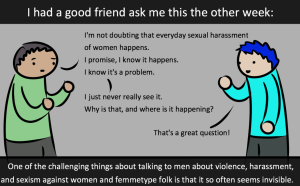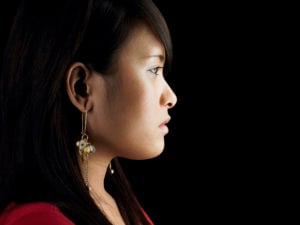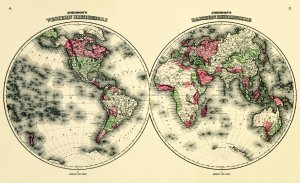
Source: Bold Italic
We’re in the middle of a revolution for racial justice.
Across the nation and around the world, social media accounts and city streets are swelling to stress that #BlackLivesMatter in the face of excessive and lethal police violence against black men.
The movement to end police brutality has become one of our country’s longest-lasting trending topics and one of its most important ongoing conversations. For the first time in a long time, we as Americans are engaged in a consistent and invaluable dialogue about racism, authority, and oppression in this country.
Feminists should be provoking, participating in, leading, and expanding that conversation — even within our own communities focused primarily on issues of gender and sex.
Actively tackling issues of race and racism should be a part of our feminist consciousness and our feminist practice.
I identify as a woman of color, but my connection to social justice has always been driven by sexism. I am, first and foremost, a feminist — albeit one who can rather easily connect the dots, because of my background, between issues of race and gender.
I have found, however, that many of my allies are reluctant to take up the fight to end racism with as much passion as they have for marching to end patriarchy.
As feminists, we need to recognize that ending racism is a part of our own struggle — no matter our backgrounds or experiences. We need to take up the cause of proving that #BlackLivesMatter, for example — no matter what we look like. We need to stand on the right side of history, now and every time it comes time to take down racist systems of oppression.
This is why.
1. Feminism Isn’t Just About Women
Ferguson is a “women’s issue” for a few reasons.
Because police violence needlessly claiming the lives of black boys is an affront to reproductive justice for black mothers. Because for masculine-presenting black women or gender non-conforming black folks who are read as men, the threat of being perceived as a threat – and dying for it – is tangible and real. Because police violence happens to women, too.
But that isn’t why feminists should be aligning themselves with the calls for justice howling out of Missouri or Staten Island or Cleveland. It shouldn’t take a “women’s issue” to bring feminists out of the woodwork to fight for equality.
Definitions of feminism vary, but I like to define it as “the political, social, and economic equality of all people.” That definition embodies, to me, what intersectional feminism strives for. It also embodies what happens when feminism truly succeeds; when all women — regardless of race, class, sexuality, and so on — achieve equality, all people everywhere will achieve equality.
When we fix the racism that holds down women of color, we will in turn liberate men and other people of color from racism. When we fix the homophobia that holds back queer women, we will in turn liberate other queer folks from that oppression.
In a culture where all women are equal, so is everyone else.
Feminism, after all, isn’t just about making sure some women have full access to educational opportunities, live safe from violence, or grow up with positive images of themselves in the media. Feminism is supposed to be about making sure all women have those rights, and that all people regardless of gender are treated equally and with respect.
That means feminism needs to fight for straight women, queer women, and the women in-between and outside of that spectrum. It means feminism needs to represent the struggles of women in all classes and careers. It means feminism needs to be about justice for women regardless of race, ethnicity, or national origin.
Gender discrimination isn’t the only thing that holds women back from being recognized as equal in our society, especially when those women are of color, queer, trans, or otherwise marginalized for reasons aside from their gender identity.
In a world dominated by the kyriarchy, we’ve come as feminists to understand that oppression is connected — and a world where one group is treated differently or unfairly by another is a world in which we are all prey for oppression.
If you’re not a person of color, conversations about race might not come easy to you. It can be hard to relate to movements outside of our realm of experience. But we shouldn’t have to experience an oppression directly in order to identify it and call it out.
As a self-identified queer person who is also cisgender, I ally myself with the struggle for trans equality by actively working to call out transphobia, educate folks about the complexities of gender and sex, and cultivate communities where trans people feel welcome. I don’t directly understand what it’s like to be trans, but I can understand how their liberation is bound up in mine.
Dr. Martin Luther King, Jr. once said that “injustice anywhere is a threat to justice everywhere.” And he was right. When we recognize racism, we should compel ourselves as feminists to fight it — no matter what our race — and perceive the struggle of people of color as an extension of our own.
Intersectional feminism means that while we work to destroy male privilege and smash patriarchy, we remain not only aware of, but vigilant about crushing racism, homophobia, transmisogny, classism, and other forms of marginalization, too.
What this looks like in practice is coalition-building, activism in solidarity with other groups of people, and checking your privilege in order to listen to the folks struggling with a different kind of experience with oppression than yours.
It means never letting someone fighting for equality feel like they’re fighting alone.
2. Gender Justice Is Racial Justice
Ending racism is pertinent to achieving gender justice for women of color, who experience oppression simultaneously because of their gender and race. It’s rarely possible to parse out racism and sexism in the experiences of people living at those intersections of oppression.
Women of color don’t walk through the world as women and racial minorities, and a feminism that doesn’t work to eliminate the unique barriers they face as people of color will ultimately fail to bring them full equality.
Many women, for example, are impacted by the wage gap. But for Latina women, who make even less than white women as compared to white men, it’s a matter of both race and gender. And where one begins and the other ends is impossible to pinpoint.
If ending wage inequality means examining the racist structures that enable them to earn only 53 cents on every white man’s dollar — as opposed to a white woman’s 77 cents — then we need to do it.
A feminism that only serves white women is a feminism that has failed. A feminism in which only white women feel safe from sexual violence is a feminism that has a failed. A feminism in which only white women only achieve prominence across industries is a feminism that has failed. A feminism in which only white girls feel liberated from gender stereotypes is a feminism that has a failed.
When feminists call conversations about race “divisive,” what they are really saying is that race isn’t their problem — and that’s problematic in and of itself. As feminists, we should practice compassion rather than resistance. As feminists, we should listen, reach out, and stand in solidarity with our sisters rather than alienate and isolate them.
3. Talking About Race Has Only Made Feminism Stronger
The history of the feminist movement is fraught with complex and painful racial politics, and conquering them has only made our work stronger.
Many of the concepts feminists now champion began as rebellions by women of color against or within a movement that often excluded, forgot, or devalued their contributions and their struggle.
“Intersectionality” is a part of our lexicon because women of color like the members of the Combahee River Collective and Kimberlé Crenshaw brought the idea of interlocking oppression into feminist organizing methodology. And it was women of color who began the reproductive justice movement, broadening dialogues around abortion access to encompass human rights, overlapping systems of oppression, and “the right to have children, not have children, and to parent the children we have in safe and healthy environments.”
These two concepts both came about in response to racism in the feminism movement, and embracing them served to make the feminism movement even stronger. Confronting issues of racism has transformed us into a larger, more vibrant, and more successful movement. Facing race has made it possible for us to realize the true nature of oppression and justice.
Silence by feminists about issues of race only serves to isolate and exclude women of color and the people who love and care about them from the cause of women’s equality. And ultimately, it only makes us weaker.
By actively paying attention to women of color about their struggle and genuinely working to help them liberate their communities, we as feminists are doing the work we committed to do when we took up the label. As feminists, we must be willing to challenge our own strategies, belief systems, and behaviors in order to end racism — just as we would to end sexism.
As our nation contemplates the consequences of racism and unchecked police power, it is also contemplating the structures in our society that created inequities for people of color. And whether you’re leading that conversation or tuning in to learn more, it matters that you recognize it as important as marching for gender justice.
[do_widget id=”text-101″]
Carmen Rios is a Contributing Writer for Everyday Feminism. She splits her time disparately between feminist rabble-rousing, writing, public speaking, and flower-picking. A professional feminist by day and overemotional writer by night, Carmen is currently Communications Coordinator at the Feminist Majority Foundation and the Feminism and Community Editor at Autostraddle. You can follow her on Twitter @carmenriosss and Tumblr to learn more about her feelings. Read her articles here.
Search our 3000+ articles!
Read our articles about:
Our online racial justice training
Used by hundreds of universities, non-profits, and businesses.
Click to learn more
Most Read Articles
- « Previous
- 1
- …
- 30
- 31
- 32



















